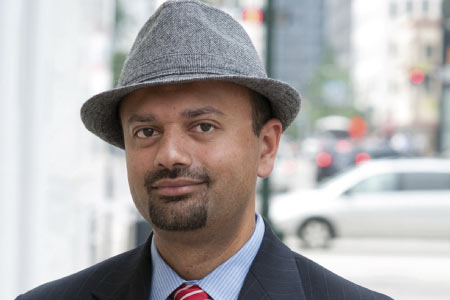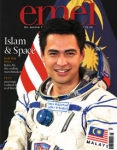
10 Questions with Monem Salam
Issue 80 May 2011
Monem Salam co-manages Amana Mutual Funds, the largest Islamic mutual fund in the world. Since 2003, the funds have grown from $40million to $3.5billion.
Despite being overtly Islamic, 75% of Amana’s investors are not Muslims, and it is the number one performing growth fund in the world in its category. He lives in Bellingham, Washington with his wife and three children.
1. To what extent is your success a product of your upbringing and background?
I wouldn’t be who I am today without my upbringing. My father was a commercial pilot with Saudi Airlines and lived with my mother in Saudi Arabia. My sister and I lived with our grandparents in the US. They did not speak much English and so we were left on our own. I had a lot of responsibility from an early age, making me mature quickly. In addition, there is a power in living with your grandparents, watching their religiosity, and that shaped me as a person. I also had a stuttering problem which I conquered by the age of 17. Overcoming it made me a strong, determined person and very much the person I am today.
2. How did your parents influence you?
Even though we were not physically together much, the time we did share was quality time. We travelled a lot as a family, as my parents loved to see and explore different cultures and parts of the world. This gave me a great background in exploring world events from a different perspective. I am also away a lot with work and I make sure that I am present in my children’s lives, not just physically but also spiritually and emotionally. Proximity can be close, but other things can be missing.
3. Were you good at school?
I did a double degree, so I have two Bachelors; one in Economics and the other in Government. I got my MBA from Dallas. As an undergraduate, I started the Muslim Student Association with a couple of other students and our annual budget on campus was $40,000. Running for student government was a real learning experience too. At the University of Texas, I was involved in student governance and giving public speeches, dealing with the university, etc. which strengthened my personality and gave me a lot of confidence.
4. What was your biggest break and was there any luck involved?
I believe God has a way of putting you in the right place at the right time, but you have to put in the hard work and be diligent in order to achieve something. God makes the opportunity knock, but are you ready? You have to be in the correct spiritual, physical and mental state of mind to be able to utilise those opportunities that God puts before you. The opportunities have always been there, but I have not been there to take advantage of them. When I was able to be a fully rounded person I saw my success develop a lot further. And we have to remember that everything has its due time. When in 1999 I applied for my current job I was not able to get the position. I then worked for Morgan Stanley for four years. That role prepared me for the work I am doing now. In retrospect, you see the reason as to why God did not make it happen before. Eventually I was able to start with Amana Mutual, which was the start of something wonderful, but before that could happen, God was to test our family.
5. What has been your biggest failure and how did you recover?
More a test than a failure — and this had to do with my daughter. My wife’s waters broke at 17 weeks. The doctors said there was a 97% chance of mortality. To be prepared for her death, I had to find out how to bury a child who is stillborn, as well as be there to support my wife. She remained in hospital for 18 weeks. My work suffered, and because I was working on a commission basis, we suffered financially as well.
It was easy to ask God why us; to feel despair at the threatened loss of the baby, and to feel dejected about the loss of income. We always ask why God is testing us, without thinking about the blessings that we have as well. My daughter is eight years old now, and I forget that she was given only a 3% chance of life. The medical bills were close to half a million dollars — more than I had ever earned at that point. God provided that insurance for me. The way you look at it gives you a different perspective. And it was because of this time that I realised I needed to change the way things were in my life. We moved 1,700 miles for me to take up the job at Amana Mutual, which had now opened up for me. You have to have true reliance on God to be able to appreciate these opportunities. To be able to rely on God in times of need and stress, but also in times happiness and joy as well.
6. What can others learn from your success?
When we see successful people, we tend to see just the result and not the journey they took to get to where they are now. There is a lot of sweat and hard work that goes into becoming successful. There is no achievement without hard work. Also, you have to have time for reflection to be able to analyse what’s going on in your life, to see what needs changing, and then to make those changes.
7. Who are your heroes in life?
Historically it is the Prophet Muhammad. Not just because he is the Messenger of God, but when reading every account of his life I have been able to get my hands on, I realise his life was an example of complete and utter reliance on God. From the contemporary period, my hero is Malcolm X because whatever he did, he was the best at. He was the best thief, the best in the Nation of Islam, the best follower of Elijah Muhammad. Embedded within his character was that he excelled at whatever he did. He also had loyalty based upon his genuine belief at the time. So, when he thought Elijah Muhammad was the messenger he was absolutely loyal to him, even when he was told things about Elijah’s character. When he eventually realised for himself the weakness of Elijah, he was able to break away, and then be loyal to God and the true Prophet Muhammad.
8. What’s the greatest pleasure you have had from your success?
I enjoy travelling, and I have been able to travel the world, experiencing different cultures, learning from other people, and seeing people in less fortunate areas and more fortunate areas. I have also learnt to fly — and made a film, entitled ‘On a Wing and a Prayer’, about it (this was after 9/11 and my wife and mother were against me doing it).
9. What are the greatest enemies of success?
Procrastination. It usually comes from fear of failure. Success and failure are from God. So if it is something you fail at, it does not mean you are worth any less. It is how you react to that failure. But most people — fearing failure — do not do anything at all, and that is the greatest enemy that you have. Do whatever you love to do as long as it is halal. And if you do what you love to do, then God will bless it, and you will be successful. And even failure — depending on how you use it — can become a success for you.
10. What would you say to people when it is time for you to leave this world?
Do what you love to do and God will take care of the rest. We are often put into educational situations or job opportunities that our family, spouses or others want us to do. You have to do what you love best. And when you do that, others will see the passion in your eyes, in your words and in your actions, and from that they will be influenced and you will become successful. People often see money and success together. But I do not see that. God has taken care of the money (rizq). No matter what we do, we will earn the amount God has set for us, so therefore do what you love.
You can read Monem’s book, A Muslim Guide to Investing and Personal Finance at:
www.islamicinvestingguide.com
Bookmark this |
|
Add to DIGG |
|
Add to del.icio.us |
|
Stumble this |
|
Share on Facebook |
|
Share this |
|
Send to a Friend |
|
Link to this |
|
Printer Friendly |
|
Print in plain text |
|


Comments
1 Comment
1
kombizz
27 Sep 11, 17:00
It is an amazing article with good info to learn.
Thank you for sharing.